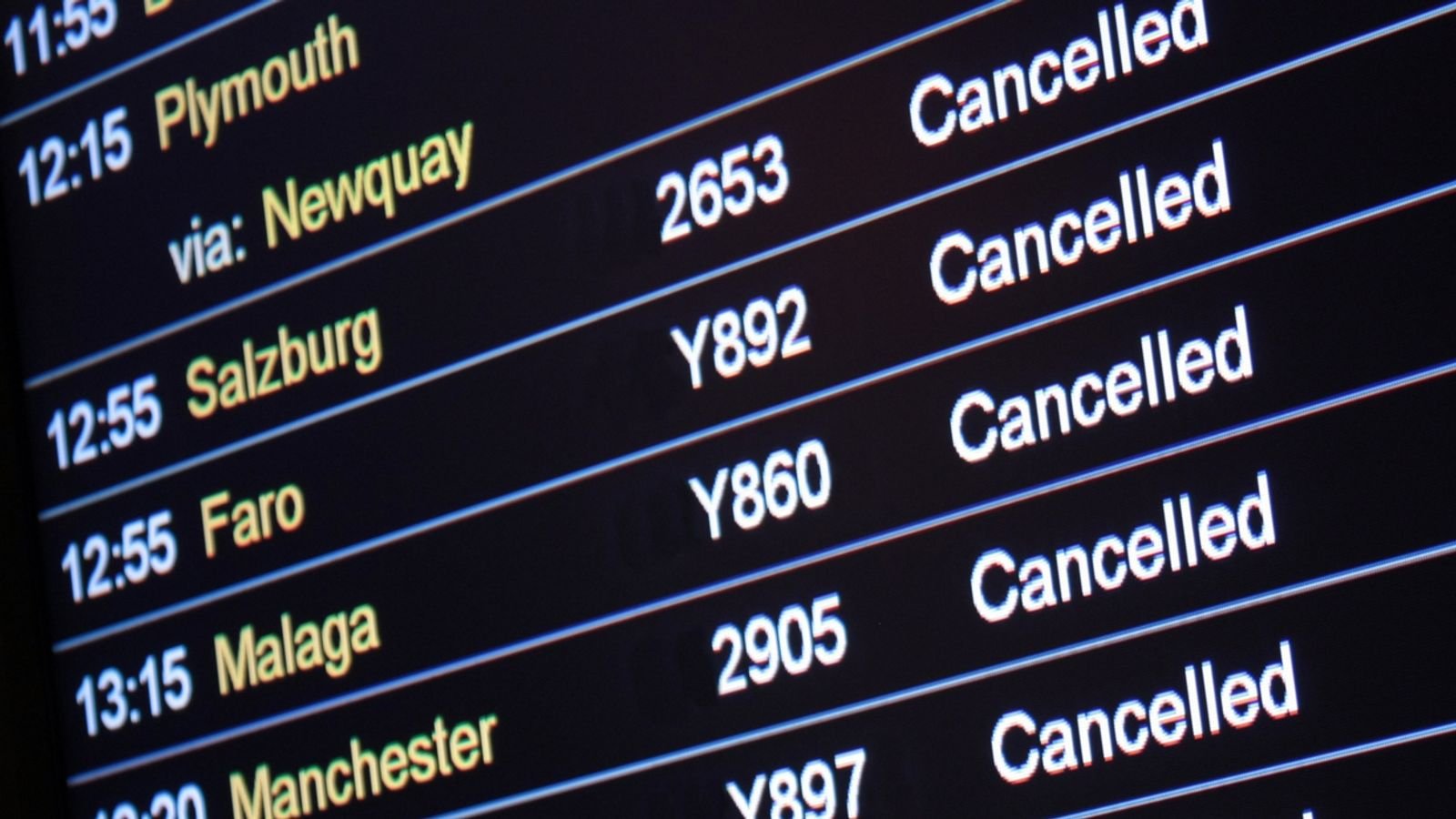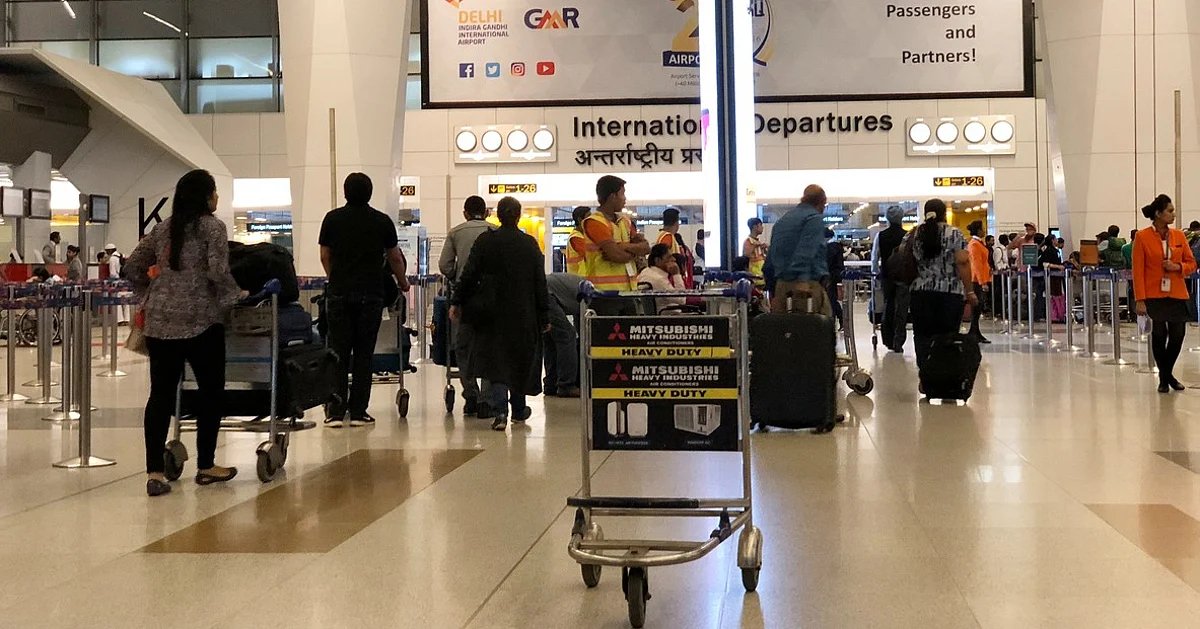Flight Buzz
‘No lessons have been learned’: Airlines furious after another technical glitch cancels flights | UK News

Airlines have reacted furiously after a technical glitch in air traffic control systems led to more than 150 flight cancellations.
The National Air Traffic Service (NATS) has apologised for the IT problems – and said systems were back up and running 20 minutes after the “radar-related issue” was detected at 4.05pm.
But with thousands of passengers suffering extensive travel disruption, during one of the busiest times of the year, airline executives have warned this isn’t good enough.
Ryanair’s chief operating officer Neal McMahon has called for NATS chief executive Martin Rolfe to resign – and claimed Wednesday’s incident was “utterly unacceptable”.
He said: “It is outrageous that passengers are once again being hit with delays and disruption due to Martin Rolfe’s continued mismanagement of NATS.
“It is clear that no lessons have been learnt since the August 2023 NATS system outage, and passengers continue to suffer as a result of Martin Rolfe’s incompetence.”
Mr McMahon was referring to a glitch that affected more than 700,000 passengers two years ago – and said that, if Mr Rolfe refuses to step down, the government should intervene.
“Heidi Alexander must act without delay to remove Martin Rolfe and deliver urgent reform of NATS’ shambolic ATC service, so that airlines and passengers are no longer forced to endure these preventable delays caused by persistent NATS failures,” he added.
The Department for Transport says Ms Alexander does not have any direct control over NATS – and no powers over staffing decisions at the service.
EasyJet’s chief operating officer David Morgan added: “It’s extremely disappointing to see an ATC failure once again causing disruption to our customers at this busy and important time of year for travel.
“While our priority today is supporting our customers, we will want to understand from NATS what steps they are taking to ensure issues don’t continue.”
NATS is yet to comment on the calls for Mr Rolfe’s resignation – but has stressed that the glitch is not believed to be “cyber related”.
“This was a radar-related issue which was resolved by quickly switching to the back-up system during which time we reduced traffic to ensure safety,” a spokesperson had said.
Departures at airports across the country have now resumed – but passengers are being urged to check with their airline before heading to terminals.
Read more from Sky News:
Ozzy Osbourne gets final tour of Birmingham
US Federal Reserve defies calls to cut interest rates
John Carr, from Stourbridge, was on his way from Heathrow to Norway to help arrange his brother’s wedding when he discovered his flight was cancelled after checking in.
“I’m pretty gutted,” he said. “We’ve got loads of stuff in the suitcases to set up the venue, because we’re obviously flying to Norway. We’ve got the wedding rehearsal to do. It’s quite stressful.”
Liberal Democrat leader Sir Ed Davey called for an urgent investigation and also referred to the “utterly unacceptable” disruption two years earlier.
“With thousands of families preparing to go on a well-earned break, this just isn’t good enough. The public deserve to have full confidence in such a vital piece of national infrastructure.”
Flights departing or arriving at a UK airport, or aircraft operated by a UK airline arriving in the EU, are subject to rules concerning delays or cancellations.
Airlines may have to provide compensation, although there are exemptions for “extraordinary circumstances”, according to the UK’s Civil Aviation Authority.
Flight Buzz
India Becomes World’s 5th Largest Air Travel Market in 2024

The International Airport Transport Association (IATA), which represents around 350 airlines, on Monday released the latest edition of the World Air Transport Statistics (WATS) for 2024.
Flight Buzz
American Airlines Cancels Over 50 Flights, Disrupting Travel Across US

Monday, August 4, 2025
Severe weather affecting certain travel corridors has resulted in American Airlines canceling in excess of 50 flights across several major U.S. airports. The active weather consisting of thunderstorms, strong winds, and low visibility has caused widespread delays and cancellations, predominantly of departures from Dallas/Fort Worth, New York, Florida, Kansas, and Georgia. All passengers are advised to monitor their flights as weather issues are expected to disrupt travel plans for the rest of the day.
Due to severe weather conditions, over 50 American Airlines flights have been canceled, representing 1% of the airline’s schedule, while 344 flights, or 9%, have been delayed. The disruptions primarily affect major airports, including Dallas/Fort Worth International Airport (KDFW), LaGuardia (KLGA), John F. Kennedy International Airport (KJFK), Orlando International (KMCO), and Kansas City International (KMCI). Thunderstorms, high winds, and poor visibility have led to unsafe travel conditions, causing cancellations and delays on routes such as Dallas/Fort Worth (KDFW) to New York, Florida, and Kansas, as well as other flights to and from Miami, Atlanta, and Greenville/Spartanburg. Travelers are urged to monitor their flight status and take advantage of rebooking options available for those affected by these disruptions.
Flight Cancellations and Delays:
The following airports are among the most affected by the widespread cancellations:
- Dallas/Fort Worth International Airport (DFW): As the hub for American Airlines, this airport has seen the majority of canceled flights. Many passengers traveling from Dallas to destinations like New York, Florida, and Kansas faced delays or rerouting.
- LaGuardia Airport (LGA), John F. Kennedy International Airport (JFK), and Reagan National Airport (DCA): Airports in New York and Washington, D.C. have experienced significant travel delays due to the storm system affecting flights between these locations and major U.S. cities.
- Orlando International Airport (MCO), Tampa International Airport (TPA), and Miami International Airport (MIA): Florida-based flights have been among those hardest hit, with more than 10 flights canceled, leaving passengers stranded.
- Kansas City International Airport (MCI): The Midwest has also been impacted, with several departures from Kansas City delayed or canceled. Flights to and from Texas were especially affected.
- Atlanta Hartsfield-Jackson International Airport (ATL): Georgia has been another region heavily impacted, with travelers experiencing disruptions due to the bad weather.
Reasons for Cancellations
The weather system causing the cancellations includes thunderstorms, high winds, and poor visibility that have made it unsafe for planes to take off and land. These conditions have created a ripple effect, with delays building up throughout the day.
Passenger Impact:
Passengers affected by the cancellations have been advised to check with American Airlines for the latest updates and rebooking options. Some travelers were informed of the cancellations via email or text message, while others learned of the disruption upon arriving at the airport.
In light of the ongoing storm, American Airlines has been working to rebook as many passengers as possible, though limited seat availability and continued bad weather could further impact travel.
What Travelers Should Know:
- Ticket Rebooking: American Airlines is offering passengers the opportunity to rebook flights without additional charges for those affected by cancellations.
- Refunds: For passengers who choose not to travel, American Airlines is providing full refunds.
- Flight Status: Travelers are encouraged to check their flight status on the American Airlines website or mobile app to stay updated on delays and cancellations.
- Weather Conditions: Airlines are expected to adjust their schedules as weather conditions evolve, with the possibility of more cancellations as the storm continues.
Severe weather has led to the cancellation of 50 American Airlines flights and delays of 344 others, disrupting travel across the U.S. The disruptions, caused by thunderstorms, high winds, and poor visibility, are impacting key airports and flights nationwide.
As American Airlines works to mitigate the effects of the severe weather, travelers should anticipate continued disruptions in flight schedules. With over 50 flights canceled and travel impacted across five states, the airline is focusing on minimizing delays and assisting passengers with rebooking and refunds. However, the situation remains fluid, and travelers are advised to stay informed and flexible as they navigate through this challenging period.
Flight Buzz
When to Book Flights, Hotels & More: Your Complete Travel Planning Guide

Planning a trip involves much more than just picking a destination. Timing your bookings correctly can save you hundreds of dollars and ensure you get the experiences you want.
This comprehensive guide breaks down exactly when you should book each component of your travel to maximize savings and minimize stress.
Start With the Essentials: Documents and Protection First
Before diving into flights and hotels, secure your travel foundations. Check your passport expiration date. Many countries require at least six months of validity remaining. Research visa requirements well in advance, as some can take weeks or months to process. For comprehensive visa information and assistance with electronic visas and travel authorizations, HandyVisas provides up-to-date entry requirements and streamlined online application processes for destinations worldwide.
Travel insurance is your safety net. Purchase it as soon as you book any non-refundable travel expenses, ideally within 15 days of your initial booking. Early purchase unlocks maximum coverage benefits, often including trip cancellation protection from the moment you buy. Policies purchased later may exclude coverage for events that occur between booking and insurance purchase.
For specialized coverage like “Cancel For Any Reason” benefits or pre-existing medical condition waivers, most insurers require purchase within 14-21 days of your initial trip deposit. Travel insurance can be booked up to 18 months in advance for single trips, with coverage beginning immediately upon purchase.
Read as well our guide: How to Choose the Right Travel Insurance
Flight Booking Strategy: Timing Is Everything
Domestic Flights
Sweet spot: 28-42 days before departure
Recent data shows the optimal booking window for domestic US flights has settled around 28-42 days in advance. CheapAir’s 2024 analysis of 917 million fares found 42 days offered the best average prices, while Expedia suggests 28 days can save up to 24% compared to last-minute bookings.
The prime booking window typically spans 21-74 days before departure, with fares changing an average of 49 times between release and takeoff. This volatility makes fare tracking essential. Set up price alerts through Google Flights or airline apps to catch sudden drops.
International Flights
Book early: 50-320 days ahead
International flight booking has become more complex, with optimal timing varying dramatically by destination. For Europe, the ideal booking window has shifted from 45 days in 2023 to an extraordinary 320 days in advance for 2024, likely due to events like the Olympics and increased post-pandemic demand.
Other international destinations show more moderate requirements:
- Caribbean: 29 days (down from 56 days in 2023)
- Asia: 71 days (reduced from 144 days in 2023)
- South America: Similar to Asia, around 60-90 days
- Canada: Book closer to departure, around 30-45 days
Google Flights data suggests booking international flights 101 days before departure on average, with the historical low price range starting 50+ days out.
Day of the Week Matters
Best booking day: Sunday
Expedia’s research shows Sunday bookings save an average of 17% compared to Friday bookings. The old “Tuesday rule” has lost relevance, with recent studies showing only 1.6% of routes benefit from Tuesday booking, yielding minimal 6% savings.
Best departure days: Tuesday, Wednesday, Thursday
Flying mid-week saves an average of 12-18% compared to weekend departures. Summer domestic flights show particularly strong savings when departing Tuesday through Thursday.
Hotel Booking: Flexibility Wins
Booking Timeline
Domestic hotels: 15-30 days ahead
Unlike flights, hotels benefit from later booking. KAYAK data reveals that booking too far in advance often results in higher prices due to dynamic pricing models. The optimal window for domestic hotels falls 15-30 days before check-in, with some properties offering last-minute deals within a week of arrival.
International hotels: 2-4 months for peak periods
For high-demand destinations and peak travel seasons, book 2-4 months ahead. Popular cities like Paris, Tokyo, and New York require earlier booking, especially during festivals, holidays, or major events.
Best Days to Book and Stay
Best booking day: Friday for domestic, Thursday for international
Skyscanner’s 2023 data shows Friday bookings save 2% on domestic hotels, while Thursday bookings save 6% on international properties. However, KAYAK’s 2024 analysis suggests these savings are marginal.
Cheapest check-in day: Sunday
Sunday check-ins can be up to 24% cheaper than Friday arrivals, as business travelers depart and weekend tourists head home. For international stays, Tuesday check-ins offer the best rates.
Seasonal Considerations
Hotel prices fluctuate dramatically based on local events and seasons. Research destination-specific peak periods—for instance, European beach destinations peak in July-August, while tropical locations may be most expensive during dry seasons.
Consider shoulder seasons (just before or after peak times) for significant savings, often 30-50% less than peak rates while still offering good weather and fewer crowds.
Activities and Attractions: Plan Ahead for Peace of Mind
Museums and Cultural Sites
Book major attractions immediately after travel dates are confirmed
Popular museums and monuments increasingly use timed-entry systems to manage crowds. The Louvre, for instance, should be booked as early as possible, especially for morning time slots that offer smaller crowds and better photo opportunities.
For world-famous sites during peak season:
- Immediately: Iconic attractions like the Louvre, Vatican Museums, Sagrada Familia, Anne Frank House…
- 2-4 months ahead: Major museums during summer or school holidays
- 1-2 weeks ahead: Most regional museums and smaller attractions
Many museums offer dynamic pricing with cheaper rates for less popular time slots. Book early morning or late afternoon visits for both better prices and smaller crowds.
Tours and Experiences
Popular tours, especially small-group experiences, food tours, and adventure activities, often sell out weeks in advance during peak seasons. Book unique experiences immediately after confirming your travel dates.
Consider purchasing city museum passes or attraction cards, but remember you’ll still need to reserve specific time slots even with these passes.
Budget vs. Luxury: Strategic Timing Differences
Budget Travel Booking Strategy
- Flights: Use error fares and flash sales; be flexible with dates
- Hotels: Book hostels and budget chains 2-4 weeks ahead; consider last-minute deals
- Activities: Look for free walking tours and municipal museums
Luxury Travel Booking Strategy
- Flights: Book premium cabin seats 3-6 months ahead for best availability
- Hotels: Luxury properties require 2-6 months advance booking for prime rooms
- Activities: Private tours and high-end experiences book months in advance
Special Circumstances and Pro Tips
Peak Season Booking (Summer, Holidays, Major Events)
- Flights: 4-6 months ahead minimum
- Hotels: 6+ months for major destinations
- Activities: Book immediately after travel dates confirmed
Last-Minute Travel
If flexibility is your priority, consider:
- Tuesday-Thursday departures for better last-minute flight deals
- Hotel apps with same-day deals
- Package deals that combine flight and hotel for savings
Group Travel
Large groups (8+ people) require earlier booking across all categories:
- Families: Add 1-2 months to standard recommendations
- Large groups: Book 6+ months ahead for coordinated travel
Red Flags to Avoid
Don’t wait if:
- Traveling during major holidays or events
- Visiting destinations with limited accommodation options
- Planning once-in-a-lifetime experiences
- Traveling with inflexible dates
- Booking for large groups
Be cautious of:
- Booking flights more than 11 months in advance (airlines may not have released schedules)
- Assuming weekend bookings always cost more (this varies by destination)
- Ignoring cancellation policies when booking early
- Booking vacation rentals without reading recent reviews
Your Action Plan
- Secure documents and insurance (as soon as trip is planned – check here)
- Book flights (28-42 days domestic, 50-320 days international)
- Reserve major attractions (immediately after flights confirmed)
- Book accommodations (15-30 days domestic, 2-4 months international peak season)
- Arrange transportation and smaller activities (2-4 weeks before travel)
Remember, these guidelines represent averages based on extensive data analysis. Your specific situation (destination popularity, travel dates, group size, and flexibility) will influence the optimal timing. The key is starting your research early while maintaining the flexibility to book when prices drop or availability becomes limited.
Set up price alerts, monitor multiple booking platforms, and don’t hesitate to book when you find a good deal that meets your needs.
In today’s dynamic travel market, hesitation often costs more than early commitment.
-

 Brand Stories2 weeks ago
Brand Stories2 weeks agoBloom Hotels: A Modern Vision of Hospitality Redefining Travel
-

 Brand Stories1 week ago
Brand Stories1 week agoCheQin.ai sets a new standard for hotel booking with its AI capabilities: empowering travellers to bargain, choose the best, and book with clarity.
-

 Destinations & Things To Do2 weeks ago
Destinations & Things To Do2 weeks agoUntouched Destinations: Stunning Hidden Gems You Must Visit
-

 Destinations & Things To Do1 week ago
Destinations & Things To Do1 week agoThis Hidden Beach in India Glows at Night-But Only in One Secret Season
-

 AI in Travel2 weeks ago
AI in Travel2 weeks agoAI Travel Revolution: Must-Have Guide to the Best Experience
-

 Brand Stories1 month ago
Brand Stories1 month agoVoice AI Startup ElevenLabs Plans to Add Hubs Around the World
-

 Brand Stories3 weeks ago
Brand Stories3 weeks agoHow Elon Musk’s rogue Grok chatbot became a cautionary AI tale
-

 Asia Travel Pulse1 month ago
Asia Travel Pulse1 month agoLooking For Adventure In Asia? Here Are 7 Epic Destinations You Need To Experience At Least Once – Zee News
-

 AI in Travel1 month ago
AI in Travel1 month ago‘Will AI take my job?’ A trip to a Beijing fortune-telling bar to see what lies ahead | China
-

 Brand Stories2 weeks ago
Brand Stories2 weeks agoContactless Hospitality: Why Remote Management Technology Is Key to Seamless Guest Experiences

You must be logged in to post a comment Login